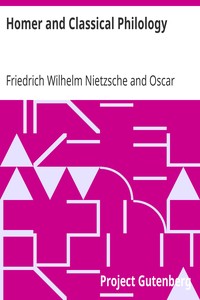Homer and Classical Philology by Friedrich Wilhelm Nietzsche
"Homer and Classical Philology" by Friedrich Wilhelm Nietzsche is an academic lecture delivered as an inaugural address at Bâle University in the late 19th century. This work discusses the intricacies and challenges associated with classical philology, particularly focused on the figure of Homer and the nature of his contributions to literature. Nietzsche reflects on the various perspectives and debates surrounding Homeric studies, positioning the complexity of philology against its many opponents. In
this lecture, Nietzsche explores the "Homeric question," primarily regarding the personality and historical context of Homer. He examines how different interpretations of Homer have evolved, reflecting broader cultural shifts in understanding poetry. Through a critique of both traditional beliefs and contemporary methodologies in literary studies, Nietzsche argues for the necessity of recognizing the amalgam of artistic and historical influences shaping the works attributed to Homer. He emphasizes that the greatness of the Homeric epics lies not solely in the genius of a singular poet, but also in the collective contributions of a culture that produced these enduring narratives. (This is an automatically generated summary.)
Read or download for free
| How to read | Url | Size | |||
|---|---|---|---|---|---|
| Read now! | https://www.gutenberg.org/ebooks/18188.html.images | 66 kB | |||
| EPUB3 (E-readers incl. Send-to-Kindle) | https://www.gutenberg.org/ebooks/18188.epub3.images | 106 kB | |||
| EPUB (older E-readers) | https://www.gutenberg.org/ebooks/18188.epub.images | 105 kB | |||
| EPUB (no images, older E-readers) | https://www.gutenberg.org/ebooks/18188.epub.noimages | 79 kB | |||
| Kindle | https://www.gutenberg.org/ebooks/18188.kf8.images | 242 kB | |||
| older Kindles | https://www.gutenberg.org/ebooks/18188.kindle.images | 234 kB | |||
| Plain Text UTF-8 | https://www.gutenberg.org/ebooks/18188.txt.utf-8 | 59 kB | |||
| Download HTML (zip) | https://www.gutenberg.org/cache/epub/18188/pg18188-h.zip | 106 kB | |||
| There may be more files related to this item. | |||||
Similar Books
About this eBook
| Author | Nietzsche, Friedrich Wilhelm, 1844-1900 |
|---|---|
| Editor | Levy, Oscar, 1867-1946 |
| Translator | Kennedy, J. M. (John McFarland) |
| Title | Homer and Classical Philology |
| Credits |
Produced by Thierry Alberto, Robert Ledger and the Online Distributed Proofreading Team at www.pgdp.net |
| Reading Level | Reading ease score: 35.4 (College-level). Difficult to read. |
| Language | English |
| LoC Class | PA: Language and Literatures: Classical Languages and Literature |
| Subject | Speeches, addresses, etc. |
| Subject | Homer |
| Subject | Classical philology |
| Category | Text |
| EBook-No. | 18188 |
| Release Date | Apr 17, 2006 |
| Copyright Status | Public domain in the USA. |
| Downloads | 435 downloads in the last 30 days. |
| Project Gutenberg eBooks are always free! | |

